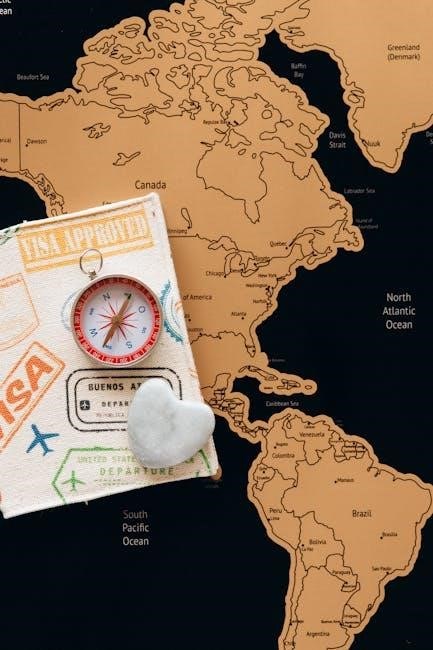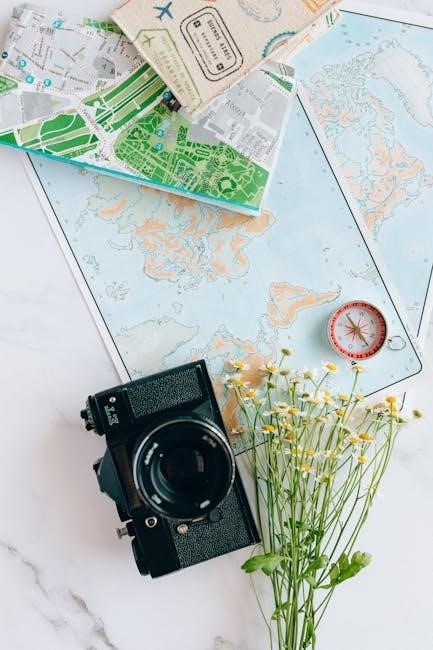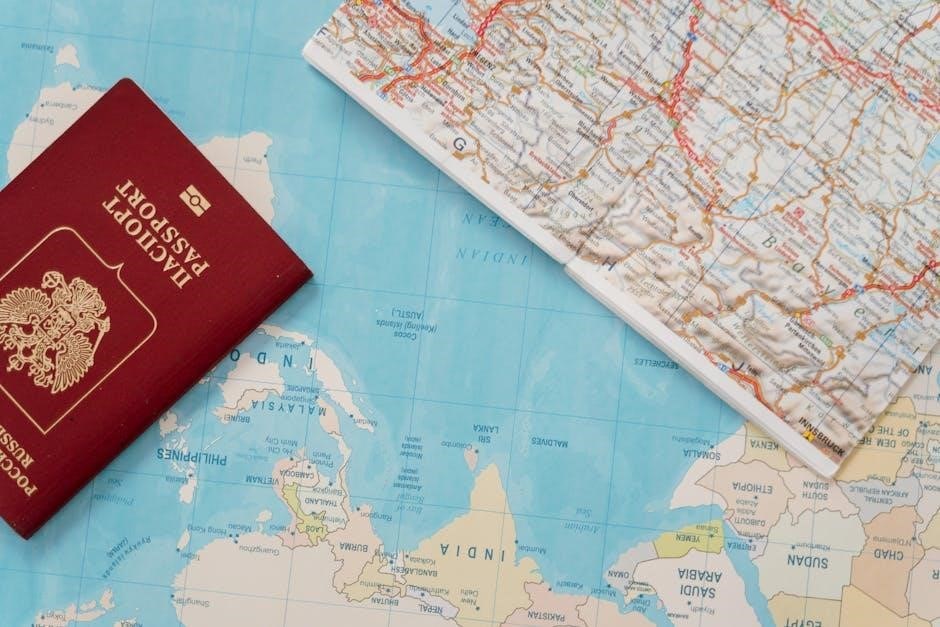Budgeting and Financial Planning for Zero-Budget Travel
Zero-budget travel requires meticulous financial planning, starting with tracking every expense and cutting unnecessary costs. Save aggressively before departure and explore ways to earn while traveling.
1.1 How to Create a Zero-Budget Travel Plan
Start by setting clear travel goals and prioritizing destinations. Break your journey into phases, focusing on free or low-cost activities. Use online tools to track expenses and create a flexible itinerary. Research local customs and cost-saving tips to maximize your experience without spending. Plan ahead to leverage free resources like public transportation and community events, ensuring every step aligns with your financial limits while maintaining a rewarding travel experience.
1.2 Prioritizing Expenses for Maximum Travel Efficiency
Begin by categorizing expenses into essentials and discretionary spending. Allocate funds to critical needs like transportation, food, and safety. Minimize costs on non-essentials by negotiating prices or seeking free alternatives. Use budgeting tools to track spending and identify areas for reduction. Prioritize experiences over material purchases to maximize the value of your travel without compromising safety or comfort. Efficiency lies in balancing necessity and enjoyment.

Finding Free Accommodation Options
Explore free accommodation options like Couchsurfing, camping, or house-sitting. These methods allow travelers to connect with locals and reduce costs while experiencing new cultures authentically.
2.1 Couchsurfing: Staying with Locals for Free
Couchsurfing connects travelers with local hosts offering free accommodation. It’s a fantastic way to immerse yourself in cultures, build friendships, and save money. Create a detailed profile, showcase your authenticity, and engage with the community to increase hosting chances. Respect hosts’ rules and contribute positively to their home life for a mutually rewarding experience.
2.2 Camping and Wild Camping: Sleeping Under the Stars
Camping and wild camping offer free accommodation in nature. Pack lightweight gear like a tent, sleeping bag, and backpack. Research safe, legal spots or designated campsites. Respect local regulations and environmental rules. Wild camping often requires discreet setups in remote areas. This method saves money, connects you with nature, and offers unique experiences under the stars while maintaining a low-cost travel lifestyle.
2.3 House-Sitting: Taking Care of Homes for Free Stay
House-sitting allows travelers to stay for free by caring for homes, often including pets or gardens. Platforms connect homeowners with trusted sitters. While it requires responsibility, it offers a unique way to experience local life. Create a profile, apply for opportunities, and enjoy comfortable stays in exchange for caretaking. This method provides both shelter and meaningful experiences without costs, ideal for budget-conscious travelers.

Earning Money While Traveling
Earning money while traveling involves freelancing, remote work, or teaching. Use skills like writing, designing, or language teaching to sustain your journey and explore new cultures.
3.1 Freelancing and Remote Work Opportunities
Freelancing and remote work offer flexible ways to earn money while traveling. Platforms like Upwork and Fiverr enable you to leverage skills such as writing, designing, or programming. Remote jobs in customer service, marketing, or tutoring are also viable options. By using digital tools and maintaining a stable internet connection, you can work from anywhere, ensuring a steady income stream to support your travels without depleting savings.
3.2 Teaching English or Other Skills Abroad
Teaching English or other skills abroad is a popular way to earn income while traveling. Many countries seek English teachers, and certifications like TEFL or TESOL can enhance opportunities. Additionally, teaching other skills such as music, art, or cooking can provide extra income. This method allows for cultural immersion and financial stability, making it a sustainable option for long-term travel.
3.3 Work Exchanges: Volunteering for Accommodation
Work exchanges offer a unique way to travel sustainably by volunteering in exchange for free accommodation. Platforms like Workaway or WWOOF connect travelers with hosts worldwide. Tasks vary from farm work to hospitality roles, allowing travelers to immerse in local cultures. This method not only saves money but also fosters meaningful connections and skill development, making it a rewarding way to explore new destinations without financial strain.

Affordable Transportation Methods
Explore cost-effective transportation options like hitchhiking, budget airlines, train passes, and carpooling apps to minimize travel expenses and maximize your journey’s reach.
4.1 Hitchhiking: Getting Rides from Strangers
Hitchhiking is a free transportation method requiring patience and trust. Stand at visible spots like highway entrances, use clear signs, and dress neatly to appear trustworthy. Smile and make eye contact to encourage stops. Stay flexible with destinations and timings. Trust your instincts about drivers and always inform someone of your plans. It’s a budget-friendly way to meet locals and experience cultures while traveling.
4.2 Budget Airlines and Train Passes
Budget airlines offer affordable flights for short distances, while train passes like Interrail or Eurail provide cost-effective multi-country travel. Book tickets in advance to secure discounts, and compare prices across platforms. Flexible travel dates and off-peak times can lower costs further. Research regional passes for unlimited travel within specific areas. Always verify booking authenticity to avoid scams, ensuring safe and budget-friendly journeys across destinations.
4.3 Carpooling and Ride-Sharing Apps
Carpooling and ride-sharing apps like BlaBlaCar, Waze Carpool, or Carpool Buddy connect drivers and passengers heading in the same direction. This cost-effective method splits fuel and toll costs, making long-distance travel affordable. Popular platforms also offer verified profiles and ratings for safety. Ride-sharing is eco-friendly and fosters community, while apps like Carpool Buddy specialize in workplace commutes. Always review driver ratings and share travel details with trusted contacts for added security.

Maximizing Free Attractions and Experiences
Explore free museums, cultural events, and parks to experience local culture without spending. Join free walking tours and engage in nature activities like hiking or picnics to save money.
5.1 Exploring Free Museums and Cultural Events
Discover free museums, galleries, and cultural events to immerse yourself in local history and art without spending. Many cities offer free admission on specific days or evenings. Attend outdoor festivals, concerts, or markets to experience the local vibe. Parks and historical landmarks are also great for exploring at no cost. These opportunities allow you to enjoy cultural enrichment while staying within your budget and connecting with the community.
5.2 Joining Free Walking Tours
Free walking tours are an excellent way to explore cities without spending money. Knowledgeable local guides provide insights into history, landmarks, and culture. These tours are usually tip-based, allowing you to pay what you can. They are also great for meeting fellow travelers. Look for flyers in hostels or online listings to join. This is a budget-friendly way to experience the city’s essence.
5.3 Engaging in Nature Activities
Exploring nature is a cost-effective way to experience destinations. Hiking, visiting local parks, or swimming in natural spots offers breathtaking views without fees. Many trails and beaches are free to access, allowing you to connect with the environment. Nature activities also provide opportunities to meet locals and fellow travelers, creating meaningful memories. Pack a picnic, enjoy scenic vistas, and immerse yourself in the beauty of your surroundings without spending a dime.

Building a Sustainable Travel Lifestyle
Sustainable travel involves adopting eco-friendly practices and minimalism. Carry reusable items, reduce waste, and choose environmentally conscious accommodations. This lifestyle fosters a sense of community and responsibility.
6.1 Minimalist Packing: Carrying Only Essentials
Minimalist packing focuses on bringing only necessities, reducing luggage weight and costs. Choose multi-use items, avoid bulky clothes, and prefer reusable gear. This approach saves money, simplifies travel, and ensures flexibility. By packing light, you minimize transportation hassles and focus on experiences over material comforts, aligning with a sustainable and budget-friendly travel lifestyle.
6.2 Cooking Your Own Meals: Saving on Food Costs
Cooking your own meals is a cornerstone of zero-budget travel, drastically reducing food expenses. Opt for accommodations with kitchen facilities to prepare meals using locally sourced ingredients. Carry reusable containers for leftovers and snacks, minimizing waste and saving money. Simple, nutritious recipes like stir-fries or rice dishes are ideal. This approach not only cuts costs but also fosters a sustainable and self-sufficient travel lifestyle.
6.3 Building a Community of Fellow Travelers
Connecting with fellow travelers fosters camaraderie and resource sharing, essential for zero-budget travel. Join online forums, social media groups, or local meetups to network. Collaborate on transportation, accommodations, or meal expenses. Shared knowledge and experiences not only enhance your journey but also create lasting friendships. Building a community ensures support and inspiration, making sustainable travel more achievable and enjoyable.

Staying Safe While Traveling on a Budget
Staying safe while traveling on a budget involves researching destinations, understanding local laws, and being prepared for emergencies. Utilize online communities for support and advice.
7.1 Researching Safe Destinations
Researching safe destinations involves checking government travel advisories, local crime rates, and health guidelines. Verify accommodations and transportation to avoid scams. Understand local laws and customs to prevent legal issues. Use apps like Google Assistant for real-time safety updates. Engage with travel communities for firsthand experiences and tips. Always stay informed about current events in your destination to ensure a secure journey.
7.2 Understanding Local Customs and Laws
Understanding local customs and laws is crucial for respectful and trouble-free travel. Research dress codes, behavioral etiquette, and legal differences to avoid unintended offenses or legal issues. Familiarize yourself with cultural norms, such as photography permissions or dietary restrictions. Respecting these aspects fosters positive interactions with locals and enhances your travel experience while keeping you safe and compliant with local regulations.
7.3 Managing Emergencies with Limited Funds
Managing emergencies with limited funds requires preparation and resourcefulness. Carry a small emergency fund for unexpected expenses and know how to access free local resources. Understand how to negotiate costs or seek aid from local communities or embassies. Stay calm, prioritize essential needs, and leverage your network for support. Planning ahead ensures you can handle crises without derailing your travel goals.
